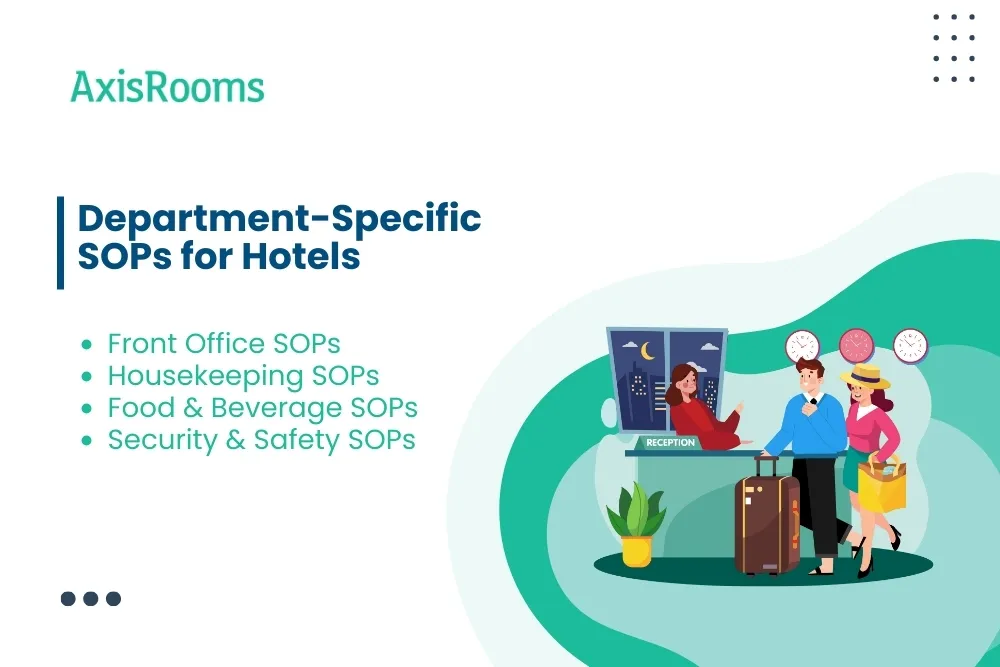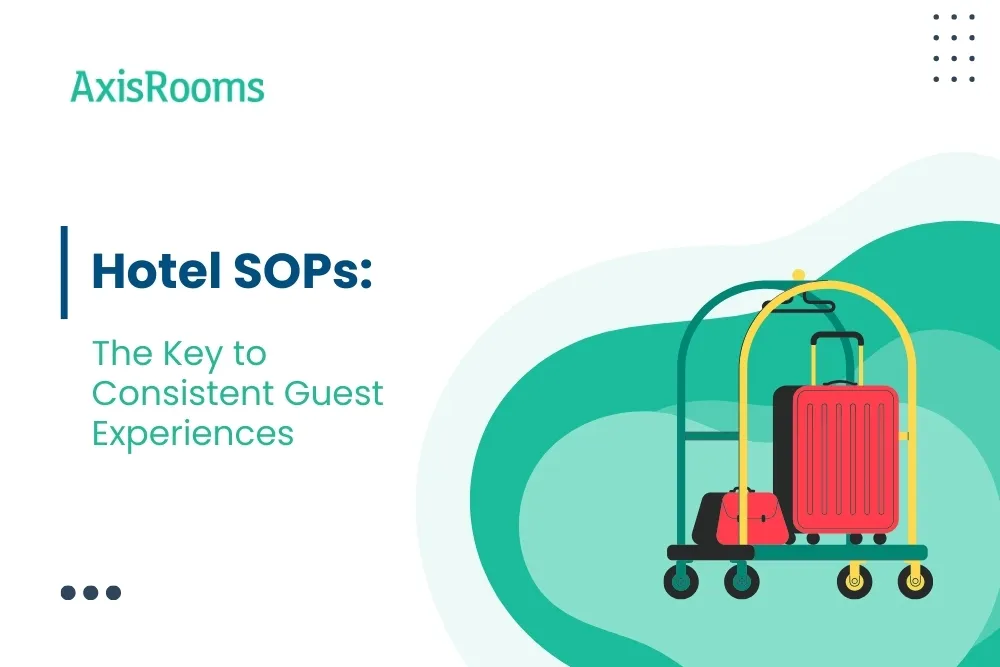Introduction: The Grand Regency’s Awakening
In the heart of bustling New York City, the Grand Regency Hotel prided itself on offering top-tier luxury and service. Luxury and service—it’s what guests expect when they step into a five-star hotel. But behind the grand chandeliers and perfectly folded linens, a problem was brewing. Guests weren’t getting the same experience every time.
One evening, a guest asked for extra towels. An hour passed. Then another. By the time housekeeping arrived, the frustration on their face said it all. Yet, the next morning, a different guest made the same request and got their towels in under five minutes. Why the inconsistency?
It wasn’t laziness. It wasn’t a lack of effort. The issue ran deeper. There were no clear, step-by-step Standard Operating Procedures (SOPs).
Many hotels, even the most prestigious ones, face this exact struggle. SOPs are like a hotel’s instruction manual, ensuring that every task—big or small—is done right, every single time.
Understanding Hotel SOPs
Standard Operating Procedures (SOPs) are detailed, written instructions designed to achieve uniformity in the performance of specific functions. In the hospitality industry, SOPs serve as a blueprint for daily hotel operations. Think of them as a hotel’s playbook—without one, staff members are left to guess the best way to do things, leading to inconsistency and mistakes.
Why SOPs Matter in Hotels
- Consistent Service Every Time: When SOPs are followed, guests get the same great experience no matter who is on duty. A clear check-in process, for example, makes sure every guest gets a warm welcome without unnecessary delays.
- Less Confusion, Faster Work: With step-by-step processes, staff know exactly what to do, reducing mistakes and speeding up service. No more confusion, no more wasted time.
- Easier Training for New Employees: Instead of learning by trial and error, new employees can follow SOPs and get up to speed quickly. This means fewer mistakes and less stress for both staff and guests.
- Better Safety and Compliance: In an industry where cleanliness and safety are top priorities, SOPs ensure that staff follow strict health guidelines. During the COVID-19 pandemic, 79% of hotel operators reported changing their room cleaning SOPs to improve safety measures(Statista, 2023). This shows how SOPs play a key role in keeping guests safe.
Implementing Effective SOPs in Hotels
Running a hotel without Standard Operating Procedures (SOPs) is like trying to bake a cake without a recipe. You might get it right sometimes, but most of the time, things won’t turn out the way they should. SOPs bring order, consistency, and efficiency to every part of hotel operations, making life easier for staff and delivering a better experience for guests.
Consistent Service, No Matter Who’s on Duty
Ever walked into a hotel and had a warm, seamless check-in one day, only to return later and feel like you were in a completely different place? That’s what happens when there’s no standardized process. With SOPs, guests get the same level of service every single time—whether it’s check-in, room service, or housekeeping. Everyone follows the same steps, which means no more inconsistencies or awkward gaps in service.
No More Confusion, Faster Work
Imagine a new front desk agent on their first day, struggling to remember how to handle a VIP request. Without clear guidelines, they might hesitate, ask around, or—worse—guess and make a mistake. SOPs remove that uncertainty. They lay out exactly what to do, step by step, so staff can work quickly and confidently. The result? Fewer errors, faster service, and happier guests.
Easier Training for New Employees
Nobody wants to feel lost on their first day at work. SOPs act like a hotel’s instruction manual, helping new hires understand their job without having to figure things out the hard way. Instead of shadowing someone for weeks or making costly mistakes, new employees can follow SOPs and get up to speed much faster. This makes training easier, saves time, and ensures everyone follows the same high standards.
Keeping Guests Safe with Clear Procedures
In the hospitality industry, safety and cleanliness are non-negotiable. Whether it’s sanitizing rooms, handling food, or responding to an emergency, hotels must follow strict protocols to protect guests and staff. SOPs ensure that everyone knows exactly what to do—whether it’s how often to disinfect common areas or what steps to take during a fire drill. When procedures are clear and consistent, safety is never left to chance.
Department-Specific SOPs for Hotels

Front Office SOPs
- Guest check-in/check-out process.
- Handling guest complaints efficiently.
- Standard greetings and communication etiquette.
Housekeeping SOPs
- Room cleaning procedures with step-by-step guidelines.
- Linen management and restocking.
- Pest control and sanitation measures.
Food & Beverage SOPs
- Table setting and service standards.
- Kitchen hygiene and food safety guidelines.
- Inventory management and waste reduction.
Security & Safety SOPs
- Emergency evacuation plans.
- Guest identity verification protocols.
- Fire safety drills and first-aid response.
The Role of Technology in SOP Implementation
Seamless Integration:
AxisRooms' solutions are designed to integrate effortlessly with existing Property Management Systems (PMS) and other third-party software, creating a centralized platform for managing front-desk operations, bookings, accounting, and guest information.
Global Reach with Local Support:
Serving over 3,200 hotels in 65+ countries, AxisRooms combines a broad international presence with localized support, ensuring that hotels receive tailored solutions that meet regional market demands.
Focus on Automation and Efficiency:
By automating routine tasks such as rate updates and inventory management, AxisRooms allows hotel staff to focus more on enhancing guest experiences, thereby improving operational efficiency.
Measuring the Impact of SOPs in Hotels
Service Quality
- A study analyzing the implementation of SOPs in hotels found that well-defined procedures lead to improved service quality, as staff can perform their duties more effectively.
- Case Study: The Ritz-Carlton Hotel Company attributes its high customer satisfaction to its rigorous adherence to SOPs.
Customer Satisfaction
- Research indicates that SOP implementation has a substantial positive effect on customer satisfaction, with a coefficient of 0.848, highlighting the importance of standardized procedures in meeting guest expectations.
Employee Performance
- SOPs provide employees with a structured framework, reducing ambiguity and enhancing performance.
- Hotels that regularly update their SOPs report 23% higher employee efficiency compared to those without structured procedures.
Overcoming Challenges in SOP Implementation
While the benefits of SOPs are evident, hotels may encounter challenges during implementation:
Resistance to Change
1. When Staff Push Back on Change
- Even though SOPs make hotel operations smoother, getting them up and running isn’t always easy. People naturally resist change, time is tight, and keeping everything up to date can feel overwhelming. But with the right approach, these challenges can be tackled without unnecessary stress.
- Solution: Instead of forcing change, make it a team effort. Hold casual workshops where employees can ask questions and share concerns. Recognize those who adapt quickly with small incentives like gift cards or “employee of the month” shoutouts. The more valued they feel, the more open they’ll be to change.
2. Not Enough Time or Resources
- Smaller hotels or independent properties might struggle with creating detailed SOPs because it takes time and effort both of which are often in short supply.
- Solution: There’s no need to reinvent the wheel. Start with ready-made templates and tweak them to fit your hotel's needs. Think of it like a recipe you don’t have to write it from scratch; you just adjust it to your own taste. This saves time while ensuring consistency.
3. Keeping SOPs Fresh and Relevant
- The hospitality industry moves fast. What worked a year ago might not make sense today. If SOPs don’t keep up, they become useless.
- Solution: Think of SOPs as living documents, not set-in-stone rules. Every few months, sit down with your team and ask, What’s working? What’s outdated? Update the SOPs based on feedback and new industry trends. This keeps them useful and practical, rather than just a stack of forgotten papers in a binder.
Conclusion: The SOP Advantage
Running a hotel without Standard Operating Procedures (SOPs) is like running a kitchen without recipes everyone might be doing their best, but the results will always be inconsistent. Some guests may get a five-star experience, while others are left wondering why their check-in took twice as long. That’s where SOPs step in.
They remove confusion, cut down mistakes, and create a rhythm that keeps everything running smoothly. Whether it’s the front desk handling a fully booked night, housekeeping making sure every room meets the same high standards, or the restaurant delivering flawless service, SOPs keep every department in sync.
But SOPs don’t just make guests happy; they help hotels work smarter, not harder. Clear procedures mean fewer wasted resources, fewer last-minute scrambles, and a faster response to problems. When properly followed, SOPs can help a hotel handle peak seasons, last-minute changes, and even unexpected crises without chaos.
Of course, just writing SOPs isn’t enough. They need to be followed every single day. And that’s where technology makes all the difference.
With Axis rooms, hotels can take SOPs off the page and bring them to life. Instead of relying on staff to remember every single step, Axis rooms makes it easy. Housekeeping updates are automated, room statuses are tracked in real-time, and front desk operations are streamlined no second-guessing, no missing steps. Staff also get instant alerts to remind them of critical tasks, like following a deep-cleaning checklist or making sure a VIP guest’s special request is handled perfectly.
SOPs aren’t just about rules; they’re the foundation of a hotel’s reputation and success. They shape guest experiences, build efficiency, and protect a hotel from bad reviews. Without them, a hotel is just winging it and in an industry where every detail matters, that’s a risk no one can afford to take.


